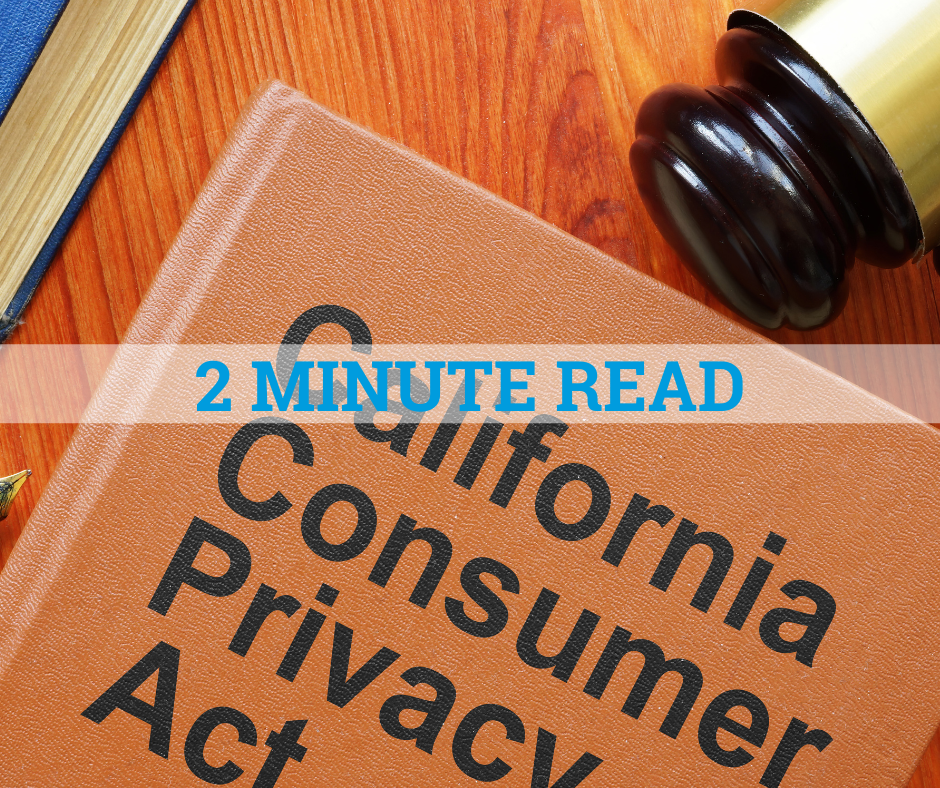
As a small business owner in California, it’s essential to stay informed about the ever-evolving legal landscape that governs consumer privacy. One such regulation is the California Consumer Privacy Act (CCPA). The CCPA was enacted in 2018 and empowers consumers with greater control over their personal information and imposes obligations on businesses that collect, use, or disclose this data. Since then, amendments have been made to this Act, with the most recent one, the California Privacy Rights Act (CPRA), taking effect on January 1st, 2023.
The CPRA created significant changes from the current law, the CCPA, which includes the following:
- The CPRA no longer includes the employee exception, which means that California employees, applicants, emergency contacts, beneficiaries, independent contractors, and members of boards of directors have the same rights as any other consumer.
- Employers must provide notice of employees' rights under the CPRA and give employees a way to tell the employer about exercising these rights. The employer has limited time to respond to requests and must properly document all responses.
- The CPRA distinguishes between "personal information" and "sensitive personal information." Personal information is "information that identifies, relates to, describes, is reasonably capable of being associated with, or could reasonably be linked, directly or indirectly, with a particular consumer or household." Sensitive personal information includes anything that reveals an individual's personal information, including Social Security number, driver's license number, state identification card, passport number, and more.
- Business-to-business transactions are now subject to the CPRA.
Complying With The CCPA
Complying with the CCPA can be a daunting undertaking for small business owners. With its intricate statutes and recent amendments that eliminated exemptions for employment and business-to-business data, understanding and adhering to the law may seem overwhelming. However, with the right approach and a clear understanding of the requirements, achieving CCPA compliance can be manageable.
Consider the following steps to ensure you remain compliant with the CCPA:
- Understand the scope of the CCPA: The CCPA's extensive provisions can be complex, but understanding its core principles is crucial. Recognize that the law applies to businesses that meet specific criteria, including those with annual gross revenue exceeding $25 million or those engaged in the sales of personal information.
- Stay informed on regulatory updates: As the CCPA continues to evolve, it's essential to stay updated on regulatory changes. The CPRA removed the exemptions for employment and B-2-B data, introducing additional complexities. It's critical to consult trusted sources such as legal experts or a professional employer organization (PEO) to ensure you're aware of any new requirements or modifications that may impact your compliance efforts.
- Revise privacy policies and disclosures: Transparency is critical under the CCPA. Review and update your privacy policies and disclosures to accurately reflect your data collection and usage practices. Clearly outline the categories of personal information collected, the purpose of collection, and consumers' rights under the CCPA. In addition, you must make these policies readily accessible on your website or mobile application to ensure compliance.
- Implement opt-out mechanisms: Given consumers' right to opt out of the sale of their personal information, provide easy-to-use opt-out mechanisms. Establish procedures to honor opt-out requests promptly, demonstrating your commitment to respecting consumer privacy.
- Strengthen data security measures: Protecting consumer data should be a top priority. Enhance your data security measures to safeguard personal information from unauthorized access, use, or disclosure. This includes employing encryption techniques, implementing access controls, conducting regular vulnerability assessments, and training employees on data protection best practices.
Have You Considered Partnering With A PEO?
As a small business owner, especially in California, where laws and regulations are constantly changing, ensuring compliance with regulations such as the CCPA can be overwhelming. However, we’re here to tell you that you don’t have to face these challenges alone. Partnering with a professional employer organization (PEO) like Group Management Services (GMS) can provide you with the support and expertise to navigate not only the CCPA but also other crucial changes affecting your business.
With a deep understanding of compliance requirements, data privacy, and HR best practices, GMS experts can help streamline your operations, update policies and procedures, and ensure your business remains compliant with the CCPA and other relevant laws. By leveraging our resources and guidance, you can focus on what you do best – growing your business – while resting assured that your compliance needs are being addressed. Take advantage of our services and empower your small business to thrive in the evolving regulatory landscape of California. Get a free quote today to secure a compliant future.